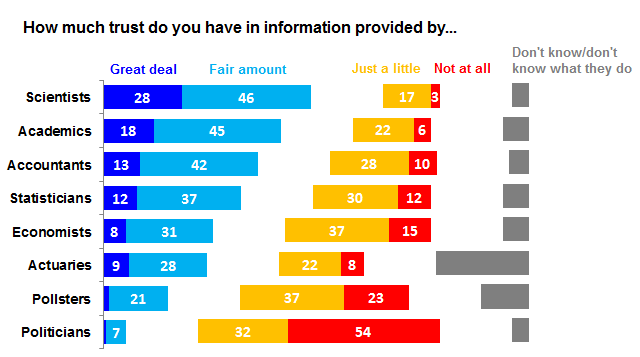Politicians least trusted when using statistics
It's been a difficult few weeks for the Government, and not just because of the enduring EU referendum debate. The Work and Pensions Secretary Iain Duncan Smith was set straight last week by the Chair of the UK statistics watchdog for his claims about the benefit cap and more recently the Education Secretary Michael Gove was found to have used a poll from UKTV Gold to justify claims about teenagers' historical ignorance.
None of this can do much good for the level of public trust in politicians which, as Full Fact has discussed before, remains consistently lower than trust in other professions such as doctors, teachers and scientists.
Yesterday, however, the polling organisation Ipsos MORI gave us a new insight into these kinds of public attitudes, commissioned by the Royal Statistics Society and King's College London and published alongside the pollster's regular trust index.
Ipsos MORI's previous polling has shown just 18% of respondents trust "politicans generally" to tell the truth. This time they asked whether people believe politicians and the media actually use statistics accurately.
What's striking about the findings is that politicians come off even worse when people are asked about their use of numbers as opposed to merely whether they "tell the truth". Barely 9% of respondents agree that politicians use figures accurately, and only 7% believe they use official statistics accurately.
What's more, whether statistics are reported by newspapers, TV channels or blogs, still only a small proportion of people agree they're reported accurately.

We shouldn't necessarily conclude that the public don't think anyone reports statistics accurately. For instance, there's potentially a distinction to be made across different types of news media. A previous Ipsos MORI poll from February found that 69% of us trust TV newsreaders to tell the truth compared to just 21% of journalists. This isn't quite the same as believing numbers are accurately reported, but could easily give rise to some variation in the recent poll's findings.
Again, though, the big finding of the poll is that a sizeable proportion of the public side against politicians specifically. Even when compared to different professions as we've seen in past 'trust indices', very few people put their trust in facts provided by our elected representatives:

Full Fact was set up to make it easier for the public to place informed trust - where it's justified - in politicians, by providing people with the information and tools they need to make informed choices. Too often it's difficult or impossible to access information necessary to understand decisions politicians take on our behalf.
But trust is also earned by recognising when you get things wrong. That's why Full Fact thinks its important to secure corrections when those in the public eye get it wrong, so that some of the damage caused to public confidence by an inaccuracy is undone.
On the latest evidence, there remains as pressing a need for this as ever.